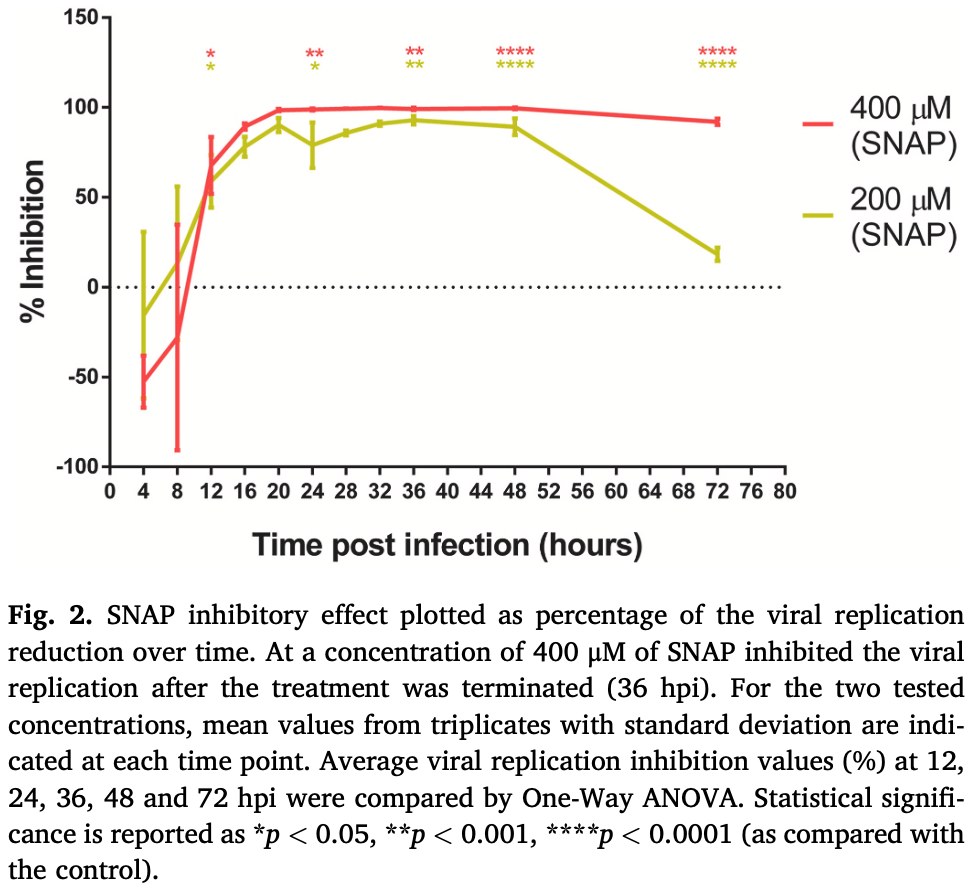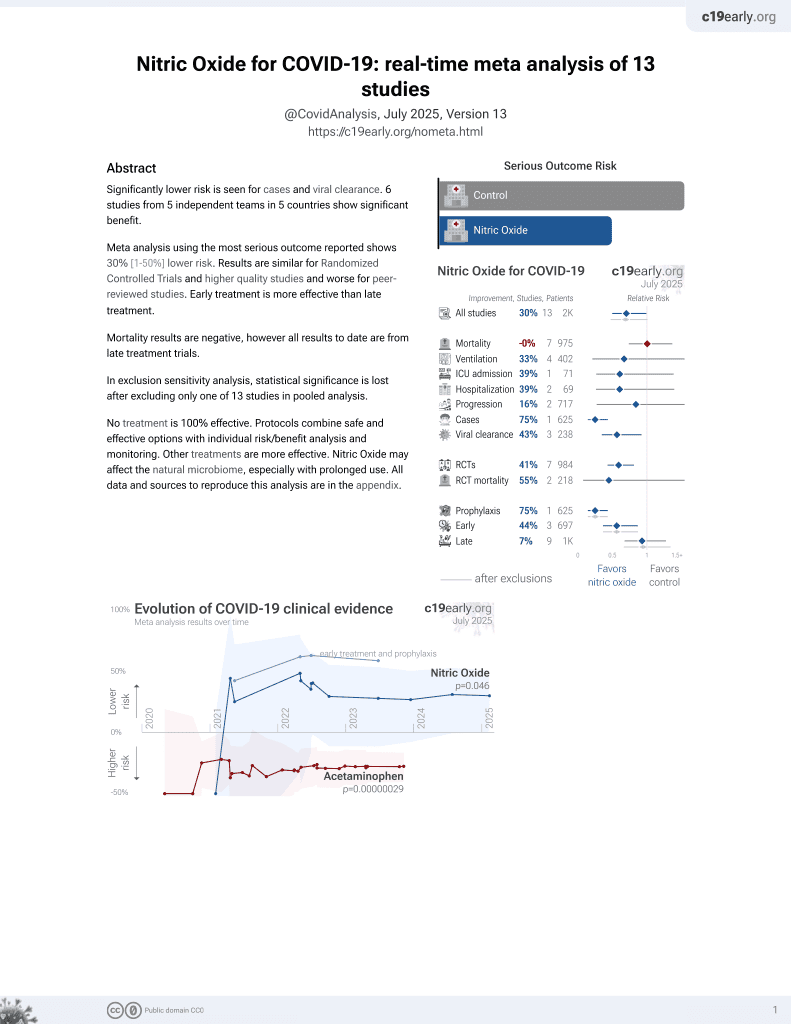
Mitigation of the replication of SARS-CoV-2 by nitric oxide in vitro
et al., Redox Biology, doi:10.1016/j.redox.2020.101734, Oct 2020
43rd treatment shown to reduce risk in
June 2022, now with p = 0.012 from 12 studies, recognized in 10 countries.
Lower risk for cases and viral clearance.
No treatment is 100% effective. Protocols
combine treatments.
6,400+ studies for
210+ treatments. c19early.org
|
In vitro study showing that nitric oxide can inhibit the replication of SARS-CoV-2 in Vero E6 cells, and identifying the SARS-CoV-2 main protease as a target for nitric oxide.
3 preclinical studies support the efficacy of nitric oxide for COVID-19:
1.
Martins et al., Broad-Spectrum Virucidal Activity of Nitric Oxide Nasal Spray (NONS) Against SARS-CoV-2 Variants and Major Respiratory Viruses, Viruses, doi:10.3390/v18010091.
Akaberi et al., 31 Oct 2020, Sweden, peer-reviewed, 8 authors.
Contact: ake.lundkvist@imbim.uu.se.
In vitro studies are an important part of preclinical research, however results may be very different in vivo.
Mitigation of the replication of SARS-CoV-2 by nitric oxide in vitro
Redox Biology, doi:10.1016/j.redox.2020.101734
The ongoing SARS-CoV-2 pandemic is a global public health emergency posing a high burden on nations' health care systems and economies. Despite the great effort put in the development of vaccines and specific treatments, no prophylaxis or effective therapeutics are currently available. Nitric oxide (NO) is a broad-spectrum antimicrobial and a potent vasodilator that has proved to be effective in reducing SARS-CoV replication and hypoxia in patients with severe acute respiratory syndrome. Given the potential of NO as treatment for SARS-CoV-2 infection, we have evaluated the in vitro antiviral effect of NO on SARS-CoV-2 replication. The NO-donor Snitroso-N-acetylpenicillamine (SNAP) had a dose dependent inhibitory effect on SARS-CoV-2 replication, while the non S-nitrosated NAP was not active, as expected. Although the viral replication was not completely abolished (at 200 μM and 400 μM), SNAP delayed or completely prevented the development of viral cytopathic effect in treated cells, and the observed protective effect correlated with the level of inhibition of the viral replication. The capacity of the NO released from SNAP to covalently bind and inhibit SARS-CoV-2 3CL recombinant protease in vitro was also tested. The observed reduction in SARS-CoV-2 protease activity was consistent with S-nitrosation of the enzyme active site cysteine.
Appendix A. Supplementary data Supplementary data to this article can be found online at https://doi. org/10.1016/j.redox.2020.101734.
References
Akaike, Fujii, Kato, Yoshitake, Miyamoto et al., Viral mutation accelerated by nitric oxide production during infection in vivo, FASEB J. Off. Publ. Fed. Am. Soc. Exp. Biol, doi:10.1096/fj.14.10.1447
Beigel, Tomashek, Dodd, Mehta, Zingman et al., Remdesivir for the treatment of covid-19 -preliminary report, N. Engl. J. Med, doi:10.1056/NEJMoa2007764
Bi, Reiss, Inhibition of vesicular stomatitis virus infection by nitric oxide, J. Virol
Chen, Liu, Gao, Sun, Chao et al., Inhalation of nitric oxide in the treatment of severe acute respiratory syndrome: a rescue trial in beijing, Clin. Infect. Dis, doi:10.1086/425357
Colasanti, Persichini, Venturini, Ascenzi, S-nitrosylation of viral proteins: molecular bases for antiviral effect of nitric oxide, IUBMB Life, doi:10.1080/713803459
Corman, Landt, Kaiser, Molenkamp, Meijer et al., Detection of 2019 novel coronavirus (2019-nCoV) by real-time RT-PCR, Euro Surveill, doi:10.2807/1560-7917.ES.2020.25.3.2000045
Croen, Evidence for antiviral effect of nitric oxide. Inhibition of herpes simplex virus type 1 replication, J. Clin. Invest, doi:10.1172/JCI116479
De Wit, Van Doremalen, Falzarano, Munster, SARS and MERS: recent insights into emerging coronaviruses, Nat. Rev. Microbiol, doi:10.1038/nrmicro.2016.81
Guarner, Three emerging coronaviruses in two DecadesThe story of SARS, MERS, and now COVID-19, Am. J. Clin. Pathol, doi:10.1093/ajcp/aqaa029
Ignarro, Inhaled NO and covid-19, Br. J. Pharmacol, doi:10.1111/bph.15085
Ignarro, Lippton, Edwards, Baricos, Hyman et al., Mechanism of vascular smooth muscle relaxation by organic nitrates, nitrites, nitroprusside and nitric oxide: evidence for the involvement of Snitrosothiols as active intermediates, J. Pharmacol. Exp. Therapeut
Keyaerts, Vijgen, Chen, Maes, Hedenstierna et al., Inhibition of SARS-coronavirus infection in vitro by S-nitroso-N-acetylpenicillamine, a nitric oxide donor compound, Int. J. Infect. Dis. IJID Off. Publ. Int. Soc. Infect. Dis, doi:10.1016/j.ijid.2004.04.012
Klingström, Åkerström, Hardestam, Stoltz, Simon et al., Nitric oxide and peroxynitrite have different antiviral effects against hantavirus replication and free mature virions, Eur. J. Immunol, doi:10.1002/eji.200535587
Nathan, Xie, Nitric oxide synthases: roles, tolls, and controls, Cell, doi:10.1016/0092-8674(94)90266-6
Nissen, Hagbom, Krambrich, Akaberi, Sharma et al., Presymptomatic viral shedding and infective ability of Severe Acute Respiratory Syndrome coronavirus 2, doi:10.21203/rs.3.rs-36269/v1
Nissen, Krambrich, Akaberi, Hoffman, Ling et al., Long-distance airborne dispersal of SARS-CoV-2 in COVID-19 wards, doi:10.21203/rs.3.rs-34643/v1
Saura, Zaragoza, Mcmillan, Quick, Hohenadl et al., An antiviral mechanism of nitric oxide: inhibition of a viral protease, Immunity, doi:10.1016/S1074-7613(00)80003-5
Xue, Yang, Shen, Zhao, Li et al., Production of authentic SARS-CoV mpro with enhanced activity: application as a novel tag-cleavage endopeptidase for protein overproduction, J. Mol. Biol, doi:10.1016/j.jmb.2006.11.073
Yu, Ichinose, Bloch, Zapol, Inhaled nitric oxide, Br. J. Pharmacol, doi:10.1111/bph.14512
Åkerström, Mousavi-Jazi, Klingström, Leijon, Lundkvist et al., Nitric oxide inhibits the replication cycle of severe acute respiratory syndrome coronavirus, J. Virol, doi:10.1128/JVI.79.3.1966-1969.2005
DOI record:
{
"DOI": "10.1016/j.redox.2020.101734",
"ISSN": [
"2213-2317"
],
"URL": "http://dx.doi.org/10.1016/j.redox.2020.101734",
"alternative-id": [
"S2213231720309393"
],
"article-number": "101734",
"assertion": [
{
"label": "This article is maintained by",
"name": "publisher",
"value": "Elsevier"
},
{
"label": "Article Title",
"name": "articletitle",
"value": "Mitigation of the replication of SARS-CoV-2 by nitric oxide in vitro"
},
{
"label": "Journal Title",
"name": "journaltitle",
"value": "Redox Biology"
},
{
"label": "CrossRef DOI link to publisher maintained version",
"name": "articlelink",
"value": "https://doi.org/10.1016/j.redox.2020.101734"
},
{
"label": "Content Type",
"name": "content_type",
"value": "article"
},
{
"label": "Copyright",
"name": "copyright",
"value": "© 2020 The Author(s). Published by Elsevier B.V."
}
],
"author": [
{
"affiliation": [],
"family": "Akaberi",
"given": "Dario",
"sequence": "first"
},
{
"ORCID": "http://orcid.org/0000-0002-5061-7143",
"affiliation": [],
"authenticated-orcid": false,
"family": "Krambrich",
"given": "Janina",
"sequence": "additional"
},
{
"affiliation": [],
"family": "Ling",
"given": "Jiaxin",
"sequence": "additional"
},
{
"affiliation": [],
"family": "Luni",
"given": "Chen",
"sequence": "additional"
},
{
"affiliation": [],
"family": "Hedenstierna",
"given": "Göran",
"sequence": "additional"
},
{
"affiliation": [],
"family": "Järhult",
"given": "Josef D.",
"sequence": "additional"
},
{
"affiliation": [],
"family": "Lennerstrand",
"given": "Johan",
"sequence": "additional"
},
{
"affiliation": [],
"family": "Lundkvist",
"given": "Åke",
"sequence": "additional"
}
],
"container-title": "Redox Biology",
"container-title-short": "Redox Biology",
"content-domain": {
"crossmark-restriction": true,
"domain": [
"elsevier.com",
"sciencedirect.com"
]
},
"created": {
"date-parts": [
[
2020,
9,
21
]
],
"date-time": "2020-09-21T17:29:29Z",
"timestamp": 1600709369000
},
"deposited": {
"date-parts": [
[
2021,
5,
10
]
],
"date-time": "2021-05-10T14:24:06Z",
"timestamp": 1620656646000
},
"funder": [
{
"DOI": "10.13039/501100004063",
"doi-asserted-by": "publisher",
"name": "Knut och Alice Wallenbergs Stiftelse"
},
{
"DOI": "10.13039/501100004359",
"doi-asserted-by": "publisher",
"name": "Vetenskapsrådet"
}
],
"indexed": {
"date-parts": [
[
2023,
2,
24
]
],
"date-time": "2023-02-24T13:31:44Z",
"timestamp": 1677245504112
},
"is-referenced-by-count": 96,
"issued": {
"date-parts": [
[
2020,
10
]
]
},
"language": "en",
"license": [
{
"URL": "https://www.elsevier.com/tdm/userlicense/1.0/",
"content-version": "tdm",
"delay-in-days": 0,
"start": {
"date-parts": [
[
2020,
10,
1
]
],
"date-time": "2020-10-01T00:00:00Z",
"timestamp": 1601510400000
}
},
{
"URL": "http://creativecommons.org/licenses/by-nc-nd/4.0/",
"content-version": "vor",
"delay-in-days": 0,
"start": {
"date-parts": [
[
2020,
9,
17
]
],
"date-time": "2020-09-17T00:00:00Z",
"timestamp": 1600300800000
}
}
],
"link": [
{
"URL": "https://api.elsevier.com/content/article/PII:S2213231720309393?httpAccept=text/xml",
"content-type": "text/xml",
"content-version": "vor",
"intended-application": "text-mining"
},
{
"URL": "https://api.elsevier.com/content/article/PII:S2213231720309393?httpAccept=text/plain",
"content-type": "text/plain",
"content-version": "vor",
"intended-application": "text-mining"
}
],
"member": "78",
"original-title": [],
"page": "101734",
"prefix": "10.1016",
"published": {
"date-parts": [
[
2020,
10
]
]
},
"published-print": {
"date-parts": [
[
2020,
10
]
]
},
"publisher": "Elsevier BV",
"reference": [
{
"DOI": "10.1093/ajcp/aqaa029",
"article-title": "Three emerging coronaviruses in two DecadesThe story of SARS, MERS, and now COVID-19",
"author": "Guarner",
"doi-asserted-by": "crossref",
"first-page": "420",
"journal-title": "Am. J. Clin. Pathol.",
"key": "10.1016/j.redox.2020.101734_bib1",
"volume": "153",
"year": "2020"
},
{
"DOI": "10.1038/nrmicro.2016.81",
"article-title": "SARS and MERS: recent insights into emerging coronaviruses",
"author": "de Wit",
"doi-asserted-by": "crossref",
"first-page": "523",
"journal-title": "Nat. Rev. Microbiol.",
"key": "10.1016/j.redox.2020.101734_bib2",
"volume": "14",
"year": "2016"
},
{
"author": "Nissen",
"key": "10.1016/j.redox.2020.101734_bib3"
},
{
"DOI": "10.1056/NEJMoa2007764",
"article-title": "Remdesivir for the treatment of covid-19 — preliminary report",
"author": "Beigel",
"doi-asserted-by": "crossref",
"journal-title": "N. Engl. J. Med.",
"key": "10.1016/j.redox.2020.101734_bib4",
"year": "2020"
},
{
"DOI": "10.1016/0092-8674(94)90266-6",
"article-title": "Nitric oxide synthases: roles, tolls, and controls",
"author": "Nathan",
"doi-asserted-by": "crossref",
"first-page": "915",
"journal-title": "Cell",
"key": "10.1016/j.redox.2020.101734_bib5",
"volume": "78",
"year": "1994"
},
{
"DOI": "10.1172/JCI116479",
"article-title": "Evidence for antiviral effect of nitric oxide. Inhibition of herpes simplex virus type 1 replication",
"author": "Croen",
"doi-asserted-by": "crossref",
"first-page": "2446",
"journal-title": "J. Clin. Invest.",
"key": "10.1016/j.redox.2020.101734_bib6",
"volume": "91",
"year": "1993"
},
{
"DOI": "10.1016/S1074-7613(00)80003-5",
"article-title": "An antiviral mechanism of nitric oxide: inhibition of a viral protease",
"author": "Saura",
"doi-asserted-by": "crossref",
"first-page": "21",
"journal-title": "Immunity",
"key": "10.1016/j.redox.2020.101734_bib7",
"volume": "10",
"year": "1999"
},
{
"DOI": "10.1002/eji.200535587",
"article-title": "Nitric oxide and peroxynitrite have different antiviral effects against hantavirus replication and free mature virions",
"author": "Klingström",
"doi-asserted-by": "crossref",
"first-page": "2649",
"journal-title": "Eur. J. Immunol.",
"key": "10.1016/j.redox.2020.101734_bib8",
"volume": "36",
"year": "2006"
},
{
"article-title": "Inhibition of SARS-coronavirus infection in vitro by S-nitroso-N-acetylpenicillamine, a nitric oxide donor compound",
"author": "Keyaerts",
"first-page": "223",
"journal-title": "Int. J. Infect. Dis. IJID Off. Publ. Int. Soc. Infect. Dis.",
"key": "10.1016/j.redox.2020.101734_bib9",
"volume": "8",
"year": "2004"
},
{
"DOI": "10.1128/JVI.79.3.1966-1969.2005",
"article-title": "Nitric oxide inhibits the replication cycle of severe acute respiratory syndrome coronavirus",
"author": "Åkerström",
"doi-asserted-by": "crossref",
"first-page": "1966",
"journal-title": "J. Virol.",
"key": "10.1016/j.redox.2020.101734_bib10",
"volume": "79",
"year": "2005"
},
{
"DOI": "10.1086/425357",
"article-title": "Inhalation of nitric oxide in the treatment of severe acute respiratory syndrome: a rescue trial in beijing",
"author": "Chen",
"doi-asserted-by": "crossref",
"first-page": "1531",
"journal-title": "Clin. Infect. Dis.",
"key": "10.1016/j.redox.2020.101734_bib11",
"volume": "39",
"year": "2004"
},
{
"DOI": "10.1111/bph.14512",
"article-title": "Inhaled nitric oxide",
"author": "Yu",
"doi-asserted-by": "crossref",
"first-page": "246",
"journal-title": "Br. J. Pharmacol.",
"key": "10.1016/j.redox.2020.101734_bib12",
"volume": "176",
"year": "2019"
},
{
"DOI": "10.1111/bph.15085",
"article-title": "Inhaled NO and covid-19",
"author": "Ignarro",
"doi-asserted-by": "crossref",
"journal-title": "Br. J. Pharmacol.",
"key": "10.1016/j.redox.2020.101734_bib13",
"year": "2020"
},
{
"article-title": "Mechanism of vascular smooth muscle relaxation by organic nitrates, nitrites, nitroprusside and nitric oxide: evidence for the involvement of S-nitrosothiols as active intermediates",
"author": "Ignarro",
"first-page": "739",
"journal-title": "J. Pharmacol. Exp. Therapeut.",
"key": "10.1016/j.redox.2020.101734_bib14",
"volume": "218",
"year": "1981"
},
{
"author": "Nissen",
"key": "10.1016/j.redox.2020.101734_bib15"
},
{
"DOI": "10.2807/1560-7917.ES.2020.25.3.2000045",
"article-title": "Detection of 2019 novel coronavirus (2019-nCoV) by real-time RT-PCR",
"author": "Corman",
"doi-asserted-by": "crossref",
"journal-title": "Euro Surveill.",
"key": "10.1016/j.redox.2020.101734_bib16",
"volume": "25",
"year": "2020"
},
{
"DOI": "10.1016/j.jmb.2006.11.073",
"article-title": "Production of authentic SARS-CoV mpro with enhanced activity: application as a novel tag-cleavage endopeptidase for protein overproduction",
"author": "Xue",
"doi-asserted-by": "crossref",
"first-page": "965",
"journal-title": "J. Mol. Biol.",
"key": "10.1016/j.redox.2020.101734_bib17",
"volume": "366",
"year": "2007"
},
{
"article-title": "Viral mutation accelerated by nitric oxide production during infection in vivo",
"author": "Akaike",
"first-page": "1447",
"journal-title": "FASEB J. Off. Publ. Fed. Am. Soc. Exp. Biol.",
"key": "10.1016/j.redox.2020.101734_bib18",
"volume": "14",
"year": "2000"
},
{
"DOI": "10.1128/JVI.69.4.2208-2213.1995",
"article-title": "Inhibition of vesicular stomatitis virus infection by nitric oxide",
"author": "Bi",
"doi-asserted-by": "crossref",
"first-page": "2208",
"journal-title": "J. Virol.",
"key": "10.1016/j.redox.2020.101734_bib19",
"volume": "69",
"year": "1995"
},
{
"DOI": "10.1080/713803459",
"article-title": "S-nitrosylation of viral proteins: molecular bases for antiviral effect of nitric oxide",
"author": "Colasanti",
"doi-asserted-by": "crossref",
"first-page": "25",
"journal-title": "IUBMB Life",
"key": "10.1016/j.redox.2020.101734_bib20",
"volume": "48",
"year": "1999"
}
],
"reference-count": 20,
"references-count": 20,
"relation": {},
"resource": {
"primary": {
"URL": "https://linkinghub.elsevier.com/retrieve/pii/S2213231720309393"
}
},
"score": 1,
"short-title": [],
"source": "Crossref",
"subject": [
"Organic Chemistry",
"Biochemistry",
"Clinical Biochemistry"
],
"subtitle": [],
"title": "Mitigation of the replication of SARS-CoV-2 by nitric oxide in vitro",
"type": "journal-article",
"update-policy": "http://dx.doi.org/10.1016/elsevier_cm_policy",
"volume": "37"
}
